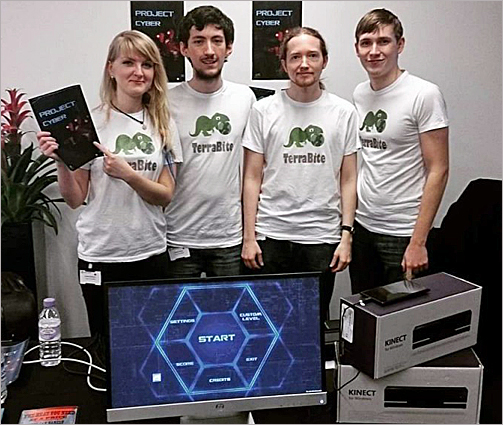Kinect-enabled PC game scores big in 2015 Imagine Cup
Team TerraBite: the name evokes mixed metaphors of earth (terra), predation (bite), and technology (terabyte). And it’s the perfect moniker for the squad from Abertay University, whose apocalyptically themed, Kinect-enabled PC game, Project Cyber, made it all the way to the World Semifinals of the 2015 Imagine Cup. On the way, they garnered accolades for the game’s look and feel, its clever narrative, and its creative use of the latest Kinect sensor.
https://www.youtube.com/watch?v=lrB-q1MxpNw
Project Cyber is a Kinect v2 experience built for the PC. The player takes on the role of a “white hat” hacker, who must go deeper and deeper into cyberspace to save the world from destruction. It features an episodic narrative; turn-based, first-person gameplay; futuristic 3D environments and evolving, dynamic audio. Players progress through various levels, each of which is built like a puzzle that can be solved by observing enemy movements and by using programs that are earned during gameplay. These programs include one for uninstalling an enemy, while another creates new tiles that can bridge gaps in the geometric world of cyberspace. The game also features a companion app, which enables users to create their own levels and offers game-related lore and tips.
Although the game can be controlled with a mouse and keyboard, it was designed for the latest Kinect sensor, and it’s at its best when played via Kinect gesture controls. One of the team’s primary objectives was to use Kinect to make a game that can be played while relaxing—physically, if not mentally. Thus they avoided overly complicated, extensive gestures or maneuvers, and instead opted for those that can be executed while seated.
The team also wanted to give players the sense that they are protagonists in a sci-fi film, moving their hands through the air to navigate cyberspace. As a result, they made the most of the hand-tracking ability of the v2 sensor and SDK 2.0. By moving their hands in front of the sensor, players advance through a cyberspace composed of hexagonal tiles. Since the game is laid out in a hexagonal grid, turns are always at a set distance—turning your hand to the left, for example, lets you look at the tile one to the left.
SDK 2.0 helped the team get a prototype running quickly. The tools and samples in the SDK gave them a good understanding of what the latest Kinect sensor can do, while Kinect Studio and the Visual Gesture Builder utilities enabled them to create the custom gestures and motions that control game play. They also took advantage of Kinect’s confidence ratings for gestures, using them to determine the level of accuracy with which a player would need to execute a gesture in order to produce the desired gameplay effect. The team also made good use of the Kinect Unity wrapper, which allowed them to see results within the game immediately.
Team TerraBite’s road to the Imagine Cup Semifinals began with their winning the gaming category in the People’s Choice awards sponsored by Stuff magazine, a UK publication devoted to technology gadgets and gear. That prize put them in the UK National Finals of the Imagine Cup, where they won the Games category—and where they met and networked with many other talented competitors.

Core members of Team TerraBite, from left to right: Gerda Gutmane, David Hudson, Maximilian Mantz
and Anthony Devlin. Associate members of the team, not shown, include Andrew Ewen, Dale Smith,
Lewis Doran, Scott Brown, Tom Marcham and Yana Hristova.
Then it was off to the Imagine Cup World Semifinals, competing against some of the best student talent from around the globe. Although Team TerraBite’s winning streak ended there, they received valuable feedback on their game and priceless experience in pitching their ideas to a wide audience—skills that will no doubt come in handy should they decide to refine their game and market it. So keep an eye out for the Kinect-enabled Project Cyber—and your chance to save the world, one gesture at a time.
The Kinect for Windows Team
Key links